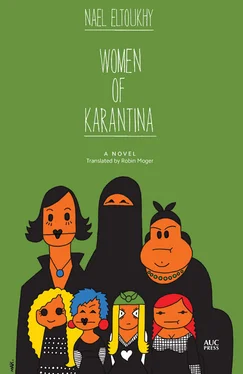Inji, twenty-one, recent graduate of the Faculty of Politics and Economics, a promising young woman, with small, dainty spectacles, a small, dainty body, and an American accent to top it off, lives alone in an apartment in Medinat Nasr. Her father passed away in Abu Dhabi, and as his only child she came into a more-than-respectable sum. She dresses simply. She loves buying clothes from pavement sellers and third-rate stores.
Ali and Inji’s first encounter wasn’t earth-shattering. A girl in glasses walked past the shop and he said, loudly, Over here, Doc. She stopped to inspect the goods and he turned to his friends and said, Honor enough she’s stopped at my place. And indeed, she did end up buying a pair of trousers. Inside the place she smiled and looked into his eyes and said, How are you, Ali? Her name was Inji, she told him, and he recalled a distant cousin living out in Abu Dhabi. He asked if she was Uncle Suleiman Abdallah al-Aleili’s girl. She smiled and told him, Yes. For a few seconds he was tongue-tied, then he asked after her health, and that of her father, and How’s the weather in the Emirates? And off she went and he forgot her. She wasn’t a first cousin: her father was his father’s cousin. She came back a second time. And a third. She was the one who didn’t forget him. And bit by bit he began to take notice of her and ask her things that weren’t to do with clothes. He wasn’t shy, it was just that he couldn’t quite believe it. Real classy, speaks English and all that, as he put it to his brother, Mustafa. Bolder, he took her number. When he asked for it, she smiled. Asked him, Why do you want it? as she prepared herself to — yes, really! — read it out to him. He was unnerved, but he pulled himself together and adjusted his thick specs: To ask after your father, miss.
Events moved along and they were powerless to stop them. Events outstripped them both. He called her up next day and told her about a new blouse just come in. She stopped by, bought the blouse, and said why not go for a little walk? The two of them. He opened his mouth. She said, We could go to Medinat Nasr, you know. It’s not far. She said, How can you live here in Ain Shams and never go to Medinat Nasr? She said, When’s your day off? She said, What time do you get off work? He didn’t answer. His mouth was still open.
The first few times they met he didn’t speak much. It was she who spoke, who suggested stuff and asked him questions, and he would respond in monosyllables. He just couldn’t credit it. The whole thing was like a dream. But gradually he started to join in, to open up and play the fool — you know, things like Inji asks him how he takes his tea and he closes his eyes, rests his top teeth on his lower lip and tells her, Hot. . scorching. . and she smiles and looks at him and her eyes shine. And he’s tongue-tied.
They were in love. That’s what it looked like to his brother, who was watching from a distance. But Ali didn’t get it.
Suleiman Abdallah was still living in Abu Dhabi when his daughter decided to return to Egypt. He died two years later. From the outset he had known the best thing he could do was to take his wife and get out of Ain Shams and its shit. He traveled to the Emirates and had a kid there, even as his cousin, Mohamed Sayyid, was killing himself for pennies in Ain Shams. Which of the two paths was the better? Mohamed Sayyid knew all about real life; with the sweat of his brow he opened a clothes shop next to the family home, got married, and had a family. True, Suleiman had done a bit of manual labor at the beginning of his sojourn in the Emirates, but he was soon able — with his brains — to make a living bringing Egyptians over. He had an in with relatives in Sohag and contacts in the Emirates. It was penny by penny at first then the dirhams began spontaneously proliferating in his bank account. He bought an apartment in Medinat Nasr, then he bought the apartment above it, and the one in front of it, and the one beside it, and by degrees became the owner of two whole floors. And Inji inherited the lot. She rented out the top floor and kept the bottom.
That was the situation when Ali met Inji. She was the girl of the guy who’d gotten out, and he was the son of someone who had become more and more entangled in his country. They were not a man and woman who had met as Destiny looked the other way. They were two opposing principles, two views of the world, and together constituted — in those naïve times — what we might term a Clash of Cultures, a harbinger of clashes to come.
Ali told her how his father had died. He dredged up distant, painful memories. He spoke to her of the South, of taar, of TV thrillers about Southern honor— The Fugitive Light and The High-Country Wolves — and he spoke of his father, found slain outside his shop, of the rattling groan that had issued from his throat, of the blood that drenched the clothes, of the store, that closed down for a full two years. Not a single customer would come near us. . Swear to God, right, I swear to God, I’d be walking in the street with my brother and I’d feel people trying to avoid us. When I was really fed up I’d go to the mosque to pray and you’ll get an idea when I tell you nobody would pray with me. And all Inji did was close her eyes, in sympathy. Then she patted his shoulder. He enfolded her hand between his palms and began his approach. He held his left leg against her right leg. He reached his hand behind her back and began moving it around under her T-shirt. She was considerably put out. Ali! she shouted, Are you out of your mind? What are you doing? Ali was not sure exactly what it was he was doing, so he was put out too. He said, Miss, don’t get me wrong. You’re like a sister to me, honest. She looked at him with outright scorn and left the store. Two days later she sent him an SMS: I feel something for you, Ali, but I need to keep my distance for a bit to make sure of it. Don’t be angry.
Inji was an exceptionally complicated character, if the expression serves. Living alone in Medinat Nasr and having her adventures. In her first year at university she said she was going to be a top diplomat. She studied hard. But at the same time she met a young man and fell in love. She was just off the boat from the Emirates and didn’t know anything about anything. The young man was using her for her money, that much she knew, but it didn’t bother her. All the same, he dumped her, and for a long while afterward she was a nervous wreck. She failed her first year. Then she abandoned her highflying dreams. She’d pass with mediocre marks and every year would have another fling, or more than one.
The most beautiful thing about Inji was that this did not break her. She remained a sunny, delightful girl, still prepared to place her trust in the world around her, unreservedly. One day she decided that she had to get to know her family. She asked Daddy about his cousin in Ain Shams and he told her he was dead. I know, she said, I mean his kids. Her father told her how to find the store, as well as he could recall, and she set her mind to spring a big surprise on her distant cousins: this flip side of Egypt she knew nothing about. Inji the Egyptophile.
But greater than her passion for Egypt was her passion for her roots. Her passion to discover her roots, to be exact. A single daydream came to her like clockwork, every day for days on end:
She’s in the Congo, chatting to a tribal type, when out of the blue she speaks her father’s name: Suleiman Abdallah. The African doesn’t understand. She says it again, and he nods. Abdoolaa! he exclaims, Abdoolaa! then leads her to the chief. The chief’s half asleep. She asks him about Abdoolaa and he doesn’t understand. The first African speaks to him in their language, and then the chief turns to her and says, That’s right. There was a boy here, a drummer, whose name was Abdoolaa, but one sweltering day they led him away to. . to. . He leaves the sentence unfinished, but with his hands he sketches the shape of pyramids. To Egypt? she asks. Yes, yes! comes his excitable reply: To Egypt! She gets to her feet, in the center of the tribal council’s circle, and dances: I’ve found my roots! I’ve found my roots!
Читать дальше












